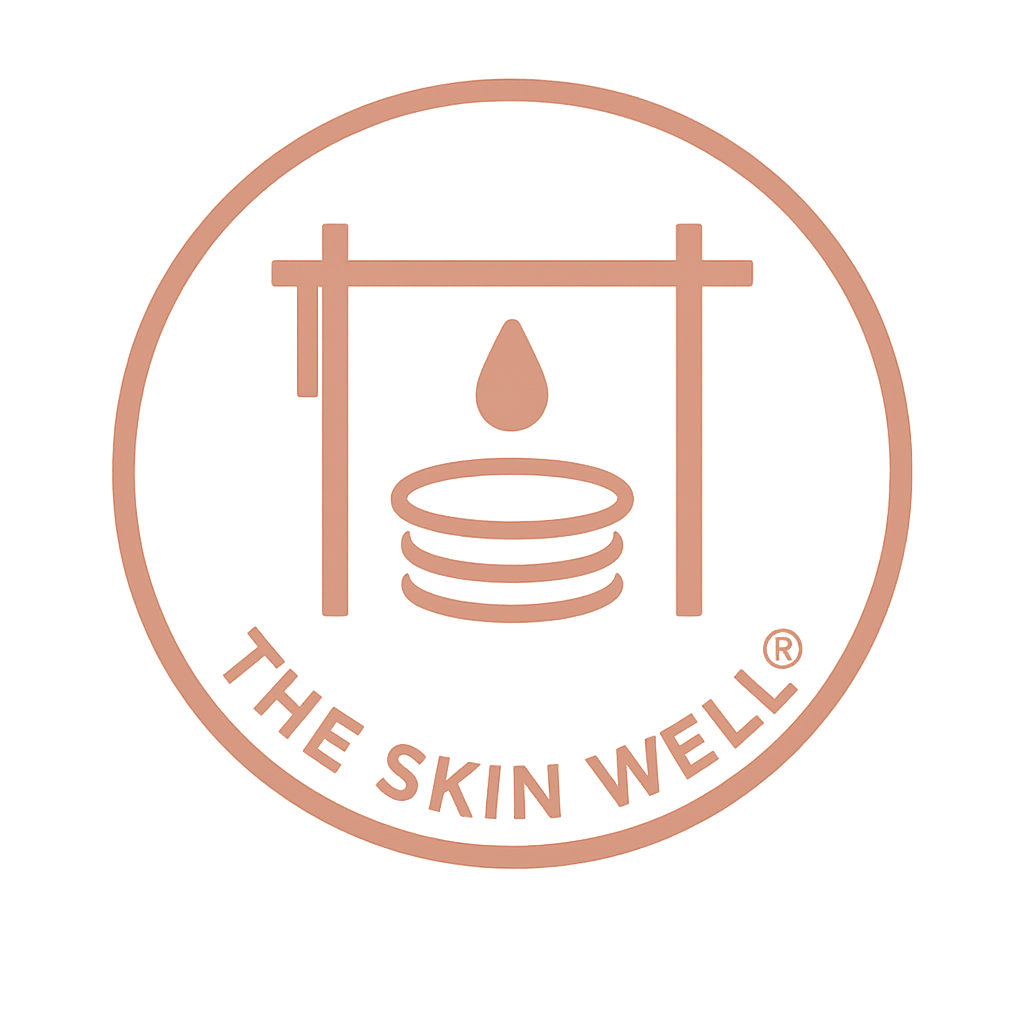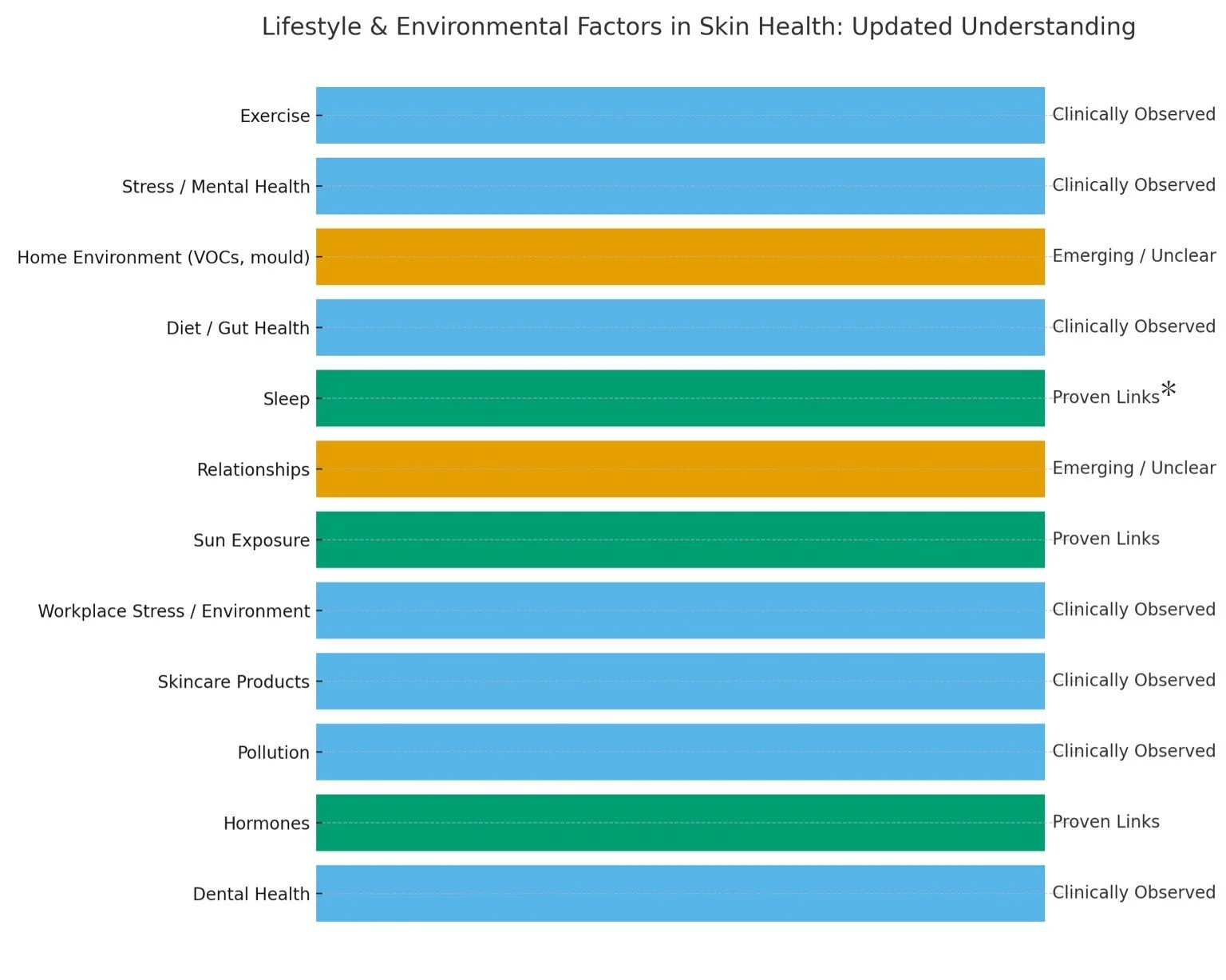The Skin Well explores how lifestyle and environment influence skin. This chart is based on UK-focused research (with some international insights where relevant) and aims to bridge the gap between what we observe in clinic and what’s officially recognised. It is not NHS guidance, but it draws on strong studies and real-world insights.
It simply asks:
Is skin health currently named as a symptom or a benefit in national messaging for each factor?
If not, the gap is worth noticing.
Understanding the Colours
• Green = Proven Links: Supported in NHS/NICE guidance or policy.
• Blue = Clinically Observed: Backed by research or clinical patterns, but not yet officially recognised.
• Amber = Emerging / Unclear: Promising but still under investigation or not widely accepted.
Factor-by-Factor Overview
1. Exercise (Clinically Observed - Blue)
Large international studies (e.g. Nurses’ Health Study) show regular physical activity reduces psoriasis risk and improves inflammatory markers. Dermatologists often observe better outcomes in active patients, yet despite this, ‘skin health’ isn’t currently listed as a benefit of exercise in national guidance for general skin health.
2. Stress / Mental Health (Clinically Observed - Blue)
Stress is known to worsen eczema, psoriasis, acne and more. While NHS guidance for psoriasis includes stress management, broader national guidance doesn’t currently list skin health as a benefit of improved mental wellbeing.
3. Home Environment (VOCs, Mould) (Emerging - Amber)
Scientific evidence is growing, and both Government guidance and Allergy UK now acknowledge that mould and VOCs can worsen eczema. Broader national guidance doesn’t currently list skin health as a benefit of improvements in the home environment.
4. Diet / Gut Health (Clinically Observed - Blue)
Research shows that dietary improvements can benefit skin conditions like acne and psoriasis. Yet broader national guidance doesn’t currently list skin health as a benefit of better diet.
5. Sleep (Proven - Green)
There is strong scientific and clinical evidence that poor sleep can impair skin barrier function and increase the severity of conditions like acne and eczema. Studies have shown that disrupted sleep contributes to inflammation and delays skin repair. While some NHS-affiliated services - such as Oxford Health CAMHS and St George’s Hospital - acknowledge this connection, it is not yet widely integrated into national NHS public health messaging. This makes sleep one of the more under-communicated yet well-supported lifestyle factors in skin health - where broader national guidance doesn’t currently list ‘skin health’ as a benefit.’
6. Relationships (Emerging - Amber)
Hostile or lonely environments have been shown to delay wound healing and worsen inflammatory skin conditions by elevating cortisol and reducing immune function. This connection is supported by both psychosomatic medicine and wound healing research. Yet broader national guidance doesn’t currently list skin health as a benefit of meaningful or positive relationships.
7. Sun Exposure (Proven - Green)
This is one of the most clearly established links between lifestyle, environment, and skin health. UV exposure is directly associated with pigmentation, premature ageing, and skin cancers. NHS and NICE both list skin health as a benefit of safe sun practices, offering comprehensive and accessible guidance on sun protection.
8. Workplace Stress / Environment (Clinically Observed - Blue)
Skin hazards in the workplace, such as irritants and allergens, are recognised under COSHH and UK health and safety law. However, broader influences like chronic stress, poor air quality, and prolonged screen exposure are not explicitly addressed in relation to skin health. Yet the workplace is increasingly linked to flare-ups of conditions like eczema, rosacea, and acne. Broader national guidance doesn’t currently list skin health as a benefit of improved workplace environments.
9. Skincare Products (Clinically Observed - Blue)
Preservatives and fragrances are known triggers for contact dermatitis. Several MCI/MI leave-on preservatives were banned following UK regulatory action. NHS guidance advises avoiding these ingredients for sensitive skin or skin with existing conditions, but barrier-focused skincare is still not widely recognised as a general public health benefit. Broader national guidance doesn’t currently list skin health as a benefit of reduced exposure to known irritants in everyday skincare products.
10. Pollution (Clinically Observed - Blue)
Air pollution is now clinically linked to skin conditions such as eczema and psoriasis, with recent Biobank studies reinforcing this connection. While dermatologists increasingly acknowledge the impact of pollution on skin, national public health guidance continues to focus primarily on respiratory effects. Improved air quality is not yet listed as a benefit to skin health in broader national guidance.
11. Hormones (Proven - Green)
Hormonal influences on the skin, such as acne and pigmentation, are widely recognised in treatment protocols. NHS and dermatology associations openly discuss these links, especially in the context of puberty, menopause, contraception, and hormone therapy. However, broader national guidance doesn’t currently list skin health as a benefit of improved hormonal balance - it is more often treated as a symptom to manage.
12. Dental Health (Clinically Observed - Blue)
Gum disease is linked to systemic inflammation and has been associated with skin conditions such as psoriasis and eczema. While evidence supporting the oral-skin connection is growing, this link is rarely reflected in public messaging. Broader national guidance doesn’t currently list skin health as a benefit of improved dental health.
Why this matters
Skin health isn’t just about five common conditions, it’s about the everyday wellbeing of a nation. We already have high-quality guidance on lifestyle and health, but skin is rarely named as a benefit. And when something isn’t named, it’s easy to overlook.
Skin is visible. It’s relatable. It reflects how we live, how we eat, sleep, move, connect, and care. People often know intuitively: “I flare when I’m stressed” or “my skin reacts when I don’t sleep well.” But those links are rarely recognised in national health messaging. When skin is excluded, so is the opportunity to understand it, talk about it, and respond with confidence.
That’s why The Skin Well began with the Happy Skin leaflets - a way to explore the 12 lifestyle and environmental factors most commonly raised by clients in real-world practice. These leaflets became the foundation for something bigger: a space to connect the dots, simplify the science, and bring skin health into the national conversation. Not just for those with conditions - but for everyone.
The Skin Well®
A grassroots, evidence-aware initiative supporting public skin education.
👉 @theskinwell_
Disclaimer
This chart and its descriptions are based on publicly available research and clinical insight compiled by The Skin Well®. They are intended for educational purposes only and do not constitute medical advice. They do not represent the views of the NHS or any governmental body. For individual health concerns, please speak to a qualified healthcare provider. These resources are designed to raise questions, highlight gaps, and explore opportunities for supporting healthier skin at a population level.
© 2025 Jacqui de Jager | The Skin Well® & The Happy Skin Clinic®
All rights reserved. This leaflet is for personal use and education only. It may not be reproduced, distributed, or adapted without written permission.

